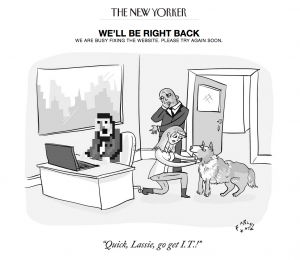In the office as well as home, everyone receives and sends email. That means that in your organization, it’s important for every one on your team to know how to detect spam, infected email attachments hoaxes, scams and other nefarious activity.
 You protect your company by making sure employees are well informed on how to detect suspicious email and what they should do. Here are some tips to share with your team for sniffing it out:
You protect your company by making sure employees are well informed on how to detect suspicious email and what they should do. Here are some tips to share with your team for sniffing it out:
First, keep your email address to yourself. Making sure you know and trust the person or entity asking for your email helps ensure spam and infected emails stay at a minimum.
Look closely at the subject lines. Subject lines such as: “Make.Money.Fast,” “Buy your RX at a discount here,” etc. are likely scams and could contain a virus. Delete without opening or report it as spam to your email carrier.
Inspect the file names of attached files. Most of the time a file that is a virus has an .exe or .vbs file extension (blank.jpg.vbs for example.) The first extension (.jpg) is just part of the name if followed by another (.vbs). Do not click on the attachment and delete the email or report it as spam to your email carrier.
Take a closer look at that email address. Posers often use web addresses with one character off from a legitimate web address, or use .net instead of .com.
Know the sender. If the sender is someone you don’t know or a company you’re not familiar with, the email could contain a virus. Do not open, and delete or report as spam to your email carrier.
Does the message make sense to you? Even if you get a message from someone you know, the message may not make sense, for example, if it says something like, “This is The Document I told you about. You can find it Here,” followed a download link, do not click the link, do not forward, do not do anything but delete and alert the sender and your IT consultant.
Do not follow links unless assured or necessary. Sometimes the virus is located on a website, rather than attached to an email. The hacker would require the victim to follow the link to a website in order for the virus to be downloaded. If not contacted/assured prior to receiving the email that the link is safe, do not follow it. Hover your mouse over the link and the address will usually pop up in the bottom left corner of the window, If it doesn’t match the URL in the web address, it could be taking you to a website that contains the virus.
Don’t share private information of any kind. People and businesses you know (who you know to be honest) will never request sensitive and private information via email. Emails that appear to be from a bank, credit card company or government agency requesting account names, numbers passwords or SSN are likely to be fraudulent. If you receive an email warning that there is a problem with a financial account, contact your credit card company or bank directly using their official phone number or through their official and legit website.
There is not an imprisoned prince anxiously awaiting your help. If you receive an email that contains a threat, urgent request, sensational or provocative language, too-good-to-be-true deals, do not respond and delete immediately. These likely are scams of the first order.
Check out the signature info. Does the email include contact legit contact information in the signature line at the end of the message? If it’s lacking details, beware.
If you are constantly receiving spam on your company email accounts, make Carolinas NetCare aware of the problem. Keep your employees updated on any current viruses or hoaxes making the rounds, and feel free to share this article with them. Being proactive is your best defense against email viruses.
ShareSEP
2017


